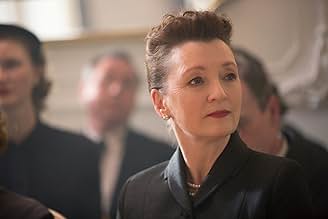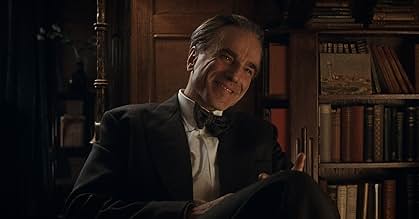Phantom Thread
- 2017
- Tous publics
- 2h 10min
Dans les années 50 à Londres, Reynolds Woodcock est un couturier renommé dont la vie fastidieuse est perturbée par une jeune femme résolue, Alma, qui devient sa muse et sa maîtresse.Dans les années 50 à Londres, Reynolds Woodcock est un couturier renommé dont la vie fastidieuse est perturbée par une jeune femme résolue, Alma, qui devient sa muse et sa maîtresse.Dans les années 50 à Londres, Reynolds Woodcock est un couturier renommé dont la vie fastidieuse est perturbée par une jeune femme résolue, Alma, qui devient sa muse et sa maîtresse.
- Réalisation
- Scénario
- Casting principal
- Récompensé par 1 Oscar
- 55 victoires et 121 nominations au total
Avis à la une
The alleged acting swan-song of Daniel Day-Lewis ("Lincoln") sees him deliver a brilliantly intense portrayal of a maestro in his craft with all the quirks and egotistical faults that come with that position.
Reynolds Woodcock is the craftsman behind a world-renowned 1950's fashion house, in demand from the elite classes and even royalty. He has a magnetic personality, is overtly self-confident, obsessive, a cruel bully and treats his girlfriends as chattels that he can tire of and dismiss from his life without a backward glance. Trying to keep the business and Reynolds on track, with ruthless efficiency, is his sister Cyril (Leslie Manville, "Maleficent").
Looking for his next conquest during a trip to his seaside residence, he reels in blushing young waitress Alma (Vicky Krieps, "The Colony"). But he gets more than he bargains for.
This is a really exquisite and gentle film. Aside from some dubious fungi-related practices, there is no violence, no sex and - aside from about half a dozen well-chosen F-words - limited swearing (of which more below). This is a study of the developing relationship between the two protagonists, with little in the way of plot. Sounds dull? Far from it. This is two hours that flew by.
What it also features is (yet) another example of extremely strong women asserting their power. A scene (well trailed in Manville's award snippets) where Cyril firmly puts Reynolds back in his box is brilliant: a real turning of tables with Woodcock meekly falling into line. And Alma makes for an incredibly rich and complicated character, one of the most interesting female roles I've seen this year so far.
It's a stellar acting performance from Day-Lewis, and while Oldman fully deserves all of his award kudos for "Darkest Hour", Day-Lewis delivers the goods without any of the make-up. It feels like Day-Lewis is a long way down the betting odds this year because "he always gets one". He certainly gets my vote ahead of all of the other three nominees.
Kreips - not an actress I know - also brilliantly holds her own, and if it wasn't such a strong female field this year she could well have been nominated.
Also worthy of note is the pervasive piano score by (suprisingly) Radiohead's Jonny Greenwood. It's really lovely and counterpoints the rest of the classical score nicely. Its BAFTA and Oscar nominations are both well deserved (though I would expect the Oscar to follow the BAFTA steer with "The Shape of Water").
All in all, this is a real tour de force by writer/director Paul Thomas Anderson ("Inherent Vice", "There Will Be Blood"). How much I enjoyed this film was a surprise to me, since I have no interest in the "fashion industry" (as my family will no doubt be quick to point out!) and I went to see this more out of 'duty' based on its Oscar buzz than because I really wanted to see it.
The big curiosity is why exactly the BBFC decided that this film was worthy of a 15 certificate rather than a 12A. Their comments on the film say "There is strong language ('f**k'), as well as milder terms including 'bloody' and 'hell'. Other issues include mild sex references and scenes of emotional upset. In one scene, a woman's nipples are visible through her slip while she is measured for a dress." For a 12A, the board say "The use of strong language (for example, 'f***') must be infrequent". I didn't count the f-words... but as I said I don't think it amounts to more than a half-dozen. Is that "frequent"? And - SHOCK, HORROR... visible covered nipples you say?! Lock up your teenagers! When you look at the gentleness of this film versus the violence within "Black Panther", you have to question this disparity.
Reynolds Woodcock is the craftsman behind a world-renowned 1950's fashion house, in demand from the elite classes and even royalty. He has a magnetic personality, is overtly self-confident, obsessive, a cruel bully and treats his girlfriends as chattels that he can tire of and dismiss from his life without a backward glance. Trying to keep the business and Reynolds on track, with ruthless efficiency, is his sister Cyril (Leslie Manville, "Maleficent").
Looking for his next conquest during a trip to his seaside residence, he reels in blushing young waitress Alma (Vicky Krieps, "The Colony"). But he gets more than he bargains for.
This is a really exquisite and gentle film. Aside from some dubious fungi-related practices, there is no violence, no sex and - aside from about half a dozen well-chosen F-words - limited swearing (of which more below). This is a study of the developing relationship between the two protagonists, with little in the way of plot. Sounds dull? Far from it. This is two hours that flew by.
What it also features is (yet) another example of extremely strong women asserting their power. A scene (well trailed in Manville's award snippets) where Cyril firmly puts Reynolds back in his box is brilliant: a real turning of tables with Woodcock meekly falling into line. And Alma makes for an incredibly rich and complicated character, one of the most interesting female roles I've seen this year so far.
It's a stellar acting performance from Day-Lewis, and while Oldman fully deserves all of his award kudos for "Darkest Hour", Day-Lewis delivers the goods without any of the make-up. It feels like Day-Lewis is a long way down the betting odds this year because "he always gets one". He certainly gets my vote ahead of all of the other three nominees.
Kreips - not an actress I know - also brilliantly holds her own, and if it wasn't such a strong female field this year she could well have been nominated.
Also worthy of note is the pervasive piano score by (suprisingly) Radiohead's Jonny Greenwood. It's really lovely and counterpoints the rest of the classical score nicely. Its BAFTA and Oscar nominations are both well deserved (though I would expect the Oscar to follow the BAFTA steer with "The Shape of Water").
All in all, this is a real tour de force by writer/director Paul Thomas Anderson ("Inherent Vice", "There Will Be Blood"). How much I enjoyed this film was a surprise to me, since I have no interest in the "fashion industry" (as my family will no doubt be quick to point out!) and I went to see this more out of 'duty' based on its Oscar buzz than because I really wanted to see it.
The big curiosity is why exactly the BBFC decided that this film was worthy of a 15 certificate rather than a 12A. Their comments on the film say "There is strong language ('f**k'), as well as milder terms including 'bloody' and 'hell'. Other issues include mild sex references and scenes of emotional upset. In one scene, a woman's nipples are visible through her slip while she is measured for a dress." For a 12A, the board say "The use of strong language (for example, 'f***') must be infrequent". I didn't count the f-words... but as I said I don't think it amounts to more than a half-dozen. Is that "frequent"? And - SHOCK, HORROR... visible covered nipples you say?! Lock up your teenagers! When you look at the gentleness of this film versus the violence within "Black Panther", you have to question this disparity.
7axb
Let us get this out of the way- Phantom Thread is a beautiful film with a great premise and promise. A couture dress designer (Daniel Day Lewis) is demanding in the extreme and finds a muse (Vicky Krieps). He enjoys using her as a dress model and a companion, but she wants more. Along the way, the director, Paul Thomas Anderson, throws hints of intrigue starting with the title of the film. There are empty pretensions of dress-making as high art, secret messages sown into dresses and haunting memories. All of this leads to- exactly nowhere. Everything Lewis and Krieps do is recorded lovingly and meticulously on film with great mood music in the background. But there is no great reveal, no deep insight into human psyche, no higher truth. In the end it comes down to what a woman wants and what the man can live with. Lewis and Krieps are excellent, especially Krieps, but Lesley Manville as Lewis's sister has the thankless job of looking stern in every scene. Nothing in the film sticks with you when you leave the theater except the dresses, photography and the music; because Anderson has not come up with anything really interesting in the story. Unlike his "There Will Blood", which was a great film, Phantom Thread is a phantom film. It is a beautiful ghost of what should have been a really good film. See it if you wish to say goodbye to Daniel Day Lewis, but keep your expectations low.
This is obviously a carefully crafted film: from the scenes, the acting, the words, the clothes, the facial and body movements, the music, it is all careful and artistic. That being said, it is terribly descriptive: an obsessive dress maker finds his muse in a strange woman who wants him to be hers alone. There is nothing else, just their play back and forth, and then the film ends. If you are here for the quality of film making, then you will probably like the film. If you want some insight into human psyche, this is a good film to learn from, with actors as dedicated as Lewis, Manville and Krieps. If you are looking for an interesting story that fills you with emotion and teaches you new things, you may be disappointed.
It doesn't help that neither of the characters in this film is even remotely relatable. Lewis' character is the typical obsessive genius that is careless of others and focuses on his work above all else. Yet he is not that much of a genius, just a failed human being with some temporary success and weird fetishes. Manville's character is a stern woman who's only purpose in life seems to care for Lewis to the point of losing herself, to keep things in balance when his histrionics threaten "the house". Krieps' character is plain creepy. If you want something to make you fear women, this is a great start. She is concomitantly lovely and well intentioned and borderline psychotic.
Bottom line: a very technical and artistic study on a rather boring subject and some unrelatable people.
It doesn't help that neither of the characters in this film is even remotely relatable. Lewis' character is the typical obsessive genius that is careless of others and focuses on his work above all else. Yet he is not that much of a genius, just a failed human being with some temporary success and weird fetishes. Manville's character is a stern woman who's only purpose in life seems to care for Lewis to the point of losing herself, to keep things in balance when his histrionics threaten "the house". Krieps' character is plain creepy. If you want something to make you fear women, this is a great start. She is concomitantly lovely and well intentioned and borderline psychotic.
Bottom line: a very technical and artistic study on a rather boring subject and some unrelatable people.
Quiet movies are not usually my thing. I like pace and story and energy. But this film crackles in the quiet. PTA makes every scene feel like a battle, and the actors' performances rise to that challenge. It may be a quiet movie about a dress maker, but it is so much more - a battle of wills, a tension against each seam, a few characters slowly resigning themselves to something other than what they planned. If you described the plot, I would be like, "Really? That is the story?" After watching it, I can say it is not just a story...it is a great story.
PHANTOM THREAD just annihilated me. It's completely worthy of all the immense hype (such as, most cinephiles considering it the best film of 2017). It grows and builds in as organic a manner that a film possibly can. At first, I wasn't sure how I felt - I needed to get to know the characters, then, through most of the movie, I was cracking up at all the tension and the misery between them, then, by the last 10 minutes, I was in tears - a flow of tears which increased each minute as I processed the power and uniqueness and realness of what I had just witnessed. They were "profound" tears. I don't know that I've ever seen a movie that so tastefully glamorizes the toxicity of love. The poison that so many of us romanticize, the poison that we NEED in our lives. There are two types of people in the world: people who feel at home in perfectly "healthy" relationships, and then there's the rest of us. This film is for the rest of us. It stands in a league of it's own. I could never have expected the conclusion - the way that the ribbon is tied, the way the final thread is sewn. It hit me like a bag of bricks. It is all of the pain in love and all of the beauty, all at once. I have never seen this story told before. It's completely original, and completely shattering. The three leads are absolutely astonishing - Daniel Day Lewis and Lesley Manville are terrifying - Vicky Krieps is the most real. The writing and directing is impeccable - P.T. Anderson's legacy continues, it's fire burning brighter than ever. Yes, this is a masterpiece. I am dead.
Le saviez-vous
- AnecdotesPaul Thomas Anderson got the initial idea for the film while he was sick in bed one day. His wife, Maya Rudolph, was tending to him and gave him a look that made him realize that she had not looked at him with such tenderness and love in a long time.
- GaffesA character says, "I don't mean to be racist..." That word didn't exist, at least in British English, in the 1950s. Someone might have used "racialist".
- Citations
Reynolds Woodcock: Kiss me, my girl, before I'm sick.
- Crédits fousThe typeface used for the credits is called Reynolds Stone and it was created by English wood engraver, typographer, and designer Reynolds Stone, who was a close friend of the parents of Daniel Day-Lewis.
- ConnexionsFeatured in The 75th Annual Golden Globe Awards (2018)
- Bandes originalesMy Foolish Heart
Written by Ned Washington and Victor Young
Performed by Oscar Peterson
Courtesy of The Verve Music Group
Under license from Universal Music Enterprises
Meilleurs choix
Connectez-vous pour évaluer et suivre la liste de favoris afin de recevoir des recommandations personnalisées
- How long is Phantom Thread?Alimenté par Alexa
Détails
- Date de sortie
- Pays d’origine
- Sites officiels
- Langues
- Aussi connu sous le nom de
- El hilo fantasma
- Lieux de tournage
- Victoria Hotel, Station Road, Robin Hood's Bay, Whitby, North Yorkshire, Angleterre, Royaume-Uni(where Reynolds meets Alma)
- Sociétés de production
- Voir plus de crédits d'entreprise sur IMDbPro
Box-office
- Budget
- 35 000 000 $US (estimé)
- Montant brut aux États-Unis et au Canada
- 21 198 205 $US
- Week-end de sortie aux États-Unis et au Canada
- 216 495 $US
- 31 déc. 2017
- Montant brut mondial
- 52 204 454 $US
- Durée
- 2h 10min(130 min)
- Couleur
- Mixage
- Rapport de forme
- 1.85 : 1
Contribuer à cette page
Suggérer une modification ou ajouter du contenu manquant



















